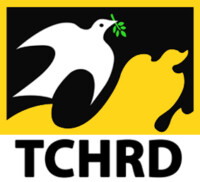Collective trial followed by sentencing is very common in Chinese courts in Tibet. This allows the court authorities to decide cases at their own free will. Many political prisoners have had their sentence decided as such. This weakens the scope for any accused to prove themselves not guilty. The following issue represents such a court scene.
The Intermediate Peoples’ Court of the Tso-Nub Tibetan Mongol Autonomous Prefecture under Qinghai Province has sentenced three Tibetans for a considerable long term. They were charged with “spying” and “forming Counter-revolutionary groups” as issued in their court verdict paper.
On 16 June 1994, the Intermediate People’s Court of the Tsonub Tibetan Mongol Autonomous Prefecture, (Chinese: Hai-Shi) under the Qinghai Province, has sentenced three Tibetans to nine, seven and six years respectively. The court revealed false eveidences and verified that the accused three were involved in espionage activities for the Tibetan Government in exile and formed a Counterrevolutionary group.

Lukar Jam, a 26-year-old man, is from Sangnak township in Shinhai county of the Tso-Lho (Chinese: Hai-Nan) Tibetan Autonomous Prefecture, Qinghai Province. He was sentenced on 16 June, 1994 to eight years imprisonment for “espionage activities”, one year for forming the “Counterrevolutionary group” and additonal five-year deprivation of political rights.
He had earlier visited India in December, 1991 and was a student for one year at the Transit School in Dharamsala, India. He returned to Tibet the next year. He was arrested on July 13, 1993, alleged for inciting the local Tibetans by distributing reactionary literature and forming a pro-independence group. Despite all these charges by the court, Lukar never accepted the alleged crime of being a “spy” for the “Dalai Clique”.
Tse-Gyon Gyal, 30 years old, from Tri-Kha County in Tso-Lho Tibetan autonomous Prefecture under the Qighai Province, was also sentenced on 16 June, 1994 to six years imprisonment for “espionage activities”, one year for forming “Counter-revolutionary Groups” and additional four years deprivation of political rights. Prior to his arrest, he worked as a staff in the Public Security Bureau of Themchen (Chinese: Tian jun) County in Tso nub (Chinese: Hai-Shi) under the inghai Province. He was charged with having “contacted the Exile Tibetan Government”. He too refused to accept the crime charged against him.
Namloyak, 25-year-old from Thangnak township, in the Tse Ghor Thang (Chinese: Xing Hai) County, under the Tso-Lho Tibetan Autonomous Prefecture was sentenced on 16 April, 1994 to five years imprisonment for “espionage”, one year imprisonment for forming “Counter-revolutionary Groups” and deprivation of politcal rights for an additional four years. The court charged him for “spying” and “distributing independence leaflet” and as part of the evidence they exhibited some books which were published by the Xinhua Publication (government authorised).
Such provision of irrelevant evidences is mainly aimed at trying hard to prove the defendants guilty. In such cases where people are charged for “espionage” crime, an unfair trial is held whereby the convicted are charged and sentenced to lengthy prison terms.
